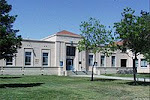I'm putting up this copy of a Hot Air post from last year because it blatantly contradicts what continues to be treated as established truth by the MSM. This originally appeared on Hot Air on 6-9-08.
Fred Hiatt perused the report issued by Jay Rockefeller and the Democrats on the Senate Intelligence Committee accusing George Bush and Dick Cheney of deception and misdirection leading up to the war on Iraq, and finds something missing: evidence. Not only does Rockefeller fail to substantiate his accusations, the report itself contradicts his public conclusions. It also sets a bar so high for action on intelligence that its absorption could paralyze the US in confronting threats until far too late.
So what did the SIC find about Bush’s statements on contemporaneous intel?
On Iraq’s nuclear weapons program? The president’s statements “were generally substantiated by intelligence community estimates.”
On biological weapons, production capability and those infamous mobile laboratories? The president’s statements “were substantiated by intelligence information.”
On chemical weapons, then? “Substantiated by intelligence information.”
On weapons of mass destruction overall (a separate section of the intelligence committee report)? “Generally substantiated by intelligence information.” Delivery vehicles such as ballistic missiles? “Generally substantiated by available intelligence.” Unmanned aerial vehicles that could be used to deliver WMDs? “Generally substantiated by intelligence information.”
As you read through the report, you begin to think maybe you’ve mistakenly picked up the minority dissent. But, no, this is the Rockefeller indictment. So, you think, the smoking gun must appear in the section on Bush’s claims about Saddam Hussein’s alleged ties to terrorism.
But statements regarding Iraq’s support for terrorist groups other than al-Qaeda “were substantiated by intelligence information.” Statements that Iraq provided safe haven for Abu Musab al-Zarqawi and other terrorists with ties to al-Qaeda “were substantiated by the intelligence assessments,” and statements regarding Iraq’s contacts with al-Qaeda “were substantiated by intelligence information.” The report is left to complain about “implications” and statements that “left the impression” that those contacts led to substantive Iraqi cooperation.
After the war, as we noted on several occasions, captured Iraqi documents confirmed two explicit connections between AQ and Iraq. Saddam Hussein’s IIS provided funds to two AQ terrorist groups. The Army of Mohammed, based in Bahrain, told the IIS that they wanted to attack American assets throughout the region, and the IIS supplied them with funds while attempting to cover their tracks, knowing what exposure would mean after 9/11. The IIS also supplied funds for Egyptian Islamic Jihad, Ayman al-Zawahiri’s organization which provided AQ with most of its leadership.
The New York Sun reminds everyone that in January 2003, the State department also had intelligence of ties between AQ and Saddam Hussein, and it came from the same group that dissented on the status of the Iraqi nuclear-weapons program:
His words demolish a talking point for Democrats who still say Al Qaeda had nothing to do with Iraq until the coalition of the willing invaded. Mr. Ford wrote that the former emir of Al Qaeda in Iraq, Abu Musab Zarqawi “has had a good relationship with Iraqi intelligence officials.” He added that intelligence on Qaeda “revealed the presence of safe house facilities in the city as well as the clear intent to remain in Baghdad. Also, foreign NGO workers outside of Iraq who are believed to provide support to al-Qaeda have also expressed their intent to set up shop in Baghdad.”
Hiatt also takes a look at the dissenting report from the Republicans, who — surprise! — didn’t get a chance to participate in the main report’s writing. Kit Bond (R-MO) reminded Rockefeller that he called Iraq an “imminent threat” in October 2002, not Bush, and that Rockefeller himself said, “To insist on further evidence could put some of our fellow Americans at risk. Can we afford to take that chance? I do not think we can.” And Rockefeller saw the same intelligence that Bush did.
What Rockefeller does in this report is to walk back the threshold, saying now that we should have waited for more evidence. That may or may not be true; after 9/11, which was the specific frame of reference Rockefeller himself used in his “imminent threat” speech, waiting for more evidence could mean waiting until an attack occurs, especially in an era of asymmetric warfare. That would at least be an honest debate, but Rockefeller eschews that for unsupported accusations of dishonesty in what turns out to be a dishonest report. He certainly felt in 2002 that Bush used the right threshold after seeing the same intel that Bush had. If we have to wait for Perry Mason-like evidence, it ensures that the US will never take action on its intelligence until it is far, far too late. (via the Anchoress)
Subscribe to:
Post Comments (Atom)





















No comments:
Post a Comment